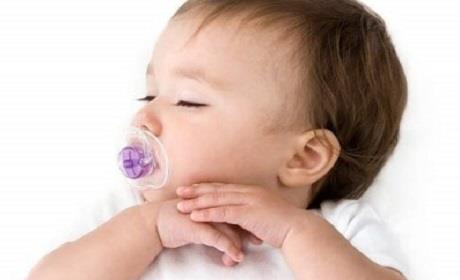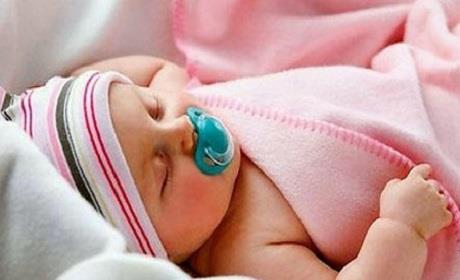Parents often use pacifiers for babies when their children are fussy or fussy about food. Find out if you should use a pacifier for your baby.
content
Should children use a pacifier?
Are there any harmful effects in using a pacifier?
Basic principles when using a pacifier
When should children not use a pacifier?
How does breast prosthesis affect the baby's teeth development?
Should children use a pacifier?
For those who are first-time parents, pampering and taking care of children is always considered a top concern and the use of pacifiers is very helpful in comforting children.
Some babies just love to be held and held and only like to suckle when it's time to eat. Others are the exact opposite, preferring to breastfeed even when not hungry.
If your baby wants to continue to nurse even after a breast or bottle feed, a pacifier is a great alternative. Pacifiers are not miraculous, but if you have done everything you can to burp, cuddle, pamper, and lull your baby but still feel uncomfortable, a pacifier can help. a lot more comfortable.

A pacifier can help your baby feel comfortable, but it can become a habit in the long run
In addition, when a baby sleeps using a pacifier has the potential to reduce the risk of sudden infant death syndrome (SIDS). Studies have not shown that using a pacifier will help prevent SIDS, but there is a significant link between pacifier use and reduced SIDS risk. Not only that, but the use of a pacifier also helps children to get rid of bad habits like sucking fingers.
Are there any harmful effects in using a pacifier?
Using pacifiers can increase the risk of middle ear infections in infants and young children. In some studies, the incidence of ear infections in children using a pacifier is 33% higher than in children who do not.
Since the risk of infection in babies is so low, you can use a pacifier until your baby is 6 months old and then have your baby weaned gradually, especially if the baby is prone to ear infections.
If you are breast-feeding, you may not want to let your baby use a pacifier until he is well-breasted. Using a pacifier and breastfeeding are two completely different actions, and babies who use a pacifier before breastfeeding can experience "nipple confusion," which is considered "difficult. of the baby in the proper grasping and sucking ”to be able to successfully breastfeed after a period of bottle or pacifier.
For that reason, you should wait until your baby is breastfed proficiently and your milk supply has stabilized before introducing a pacifier. If your baby is breastfed well, has gained weight and has a stable feeding schedule, you can offer a pacifier sooner.
Sucking on pacifiers is easy to become a habit and many parents do not want to let their children use them because they do not want to have a headache about letting their children quit pacifiers or they simply do not like a 3-year-old but also suck on a pacifier. .
If you let your child use a pacifier and do not want a "battle" on pacifier, you should quit before the baby turns 1 year old .
Basic principles when using a pacifier
If you do decide to use a pacifier, remember to keep these rules:
Let your child decide. If your baby seems to like pacifiers then great. But if your child doesn't like it, don't force them to use them. You can try again at a different time or respect your child's preferences and don't force them to use it.
In any case, do not use a pacifier to delay feeding or to replace your attention. Have your baby use a pacifier between meals when he is not hungry.
Also, do not immerse the pacifier in juice or sugar water as this can lead to tooth decay.
You can try giving your baby a pacifier before a nap, but if it falls out of the mouth while the baby is sleeping, don't put the nipple back in the mouth. When your baby fussy and cries, try to comfort him in other ways, such as cuddling, lulling, or singing.
However, in some cases, it is imperative that your child wait for you to feed or comfort you, as if you were paying for a supermarket bill, it is perfectly reasonable to use a pacifier.
Never tie a nipple to a baby's neck or crib as this can cause choking. The safest method is to attach a pacifier to your baby's clothing with a special clip.
Choose a pacifier that is safe and suitable for your baby and keep it clean by rinsing it with warm water, replacing it as soon as you see minor cracks or signs of wear.
When should children not use a pacifier?
Do not let your child use a pacifier when there is a problem with weight. If your baby is having trouble breastfeeding or if you have trouble maintaining a supply of milk, it is best to stop using it immediately. In addition, you must also consider not giving the child to use if the child has had ear infections many times.
In the case of a baby who is premature and underweight like other babies, the use of a pacifier is not the main factor preventing the baby from gaining weight, but it can also protect the baby from SIDS, so consult consult a doctor before making a decision.

A pacifier can be used for a short nap
How does breast prosthesis affect the baby's teeth development?
Pacifiers in the early years of life can affect a baby's oral development, but not many babies use it long enough to lead to these harms.
During use, babies only have baby teeth , and permanent teeth usually begin to grow when the baby is 6 years old. If you are concerned about this, ask your doctor or dentist to check your child's jaws and teeth.













